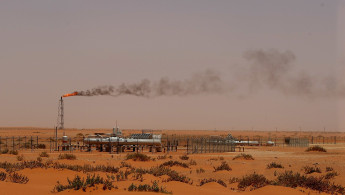Oil prices stabilise after Saudi output cut pledge, but economists warn of potential economic problems
Saudi Arabia's recent output cuts has seen oil prices rise, but a jolt might not necessarily be a good thing for the kingdom, economists have warned.
2 min read
Saudi Arabia is looking to move away from a reliance on oil [AFP]
Oil prices stabilised on Monday, following expectations that energy giant Saudi Arabia will keep production cuts in place.
It follows a recent two percent plunge in prices with the West Texas Intermediate (WTI) sinking below $50 a barrel on Friday, with Monday seeing a rise by nine cents to $49.38.
Saudi Arabia is expected to restrain production to help stabilise the market - which has been hit hard by low oil prices - at least until Aramco IPO next years.
Saudi King Salman al-Saud visited Moscow last week, leading to speculation that the two oil giants will agree on future cuts ahead of an OPEC meeting next month.
Salman met with President Vladimir Putin where the two leaders discussed the prospect of further oil cuts after March 2018, Russian state media reported.
"Undoubtedly, the state of affairs in the oil markets and Russian-Saudi cooperation in the interests of stabilising the situation on these markets were touched upon," a Kremlin spokesperson told TASS news agency.
Russia and Saudi Arabia have both been hit hard by low oil prices, with Riyadh unveiling Vision 2030. The plan aims to diversify the economy away from oil and cut government spending as the world enters a post-oil age.
Economists have warned that higher oil prices could sap enthusiasm for Riyadh to carry out essential reforms that will help the economy in the long run.
"[Countries] kick-start reform programmes when oil prices are low, sometimes the enthusiasm wanes when commodity prices move higher," James McCormack, Fitch's global head of sovereign ratings, said in Riyadh last week according to Gulf Times.
"That is potentially a risk here. It will take continued focus on discipline to maintain many of those initiatives with higher oil prices."
It follows a recent two percent plunge in prices with the West Texas Intermediate (WTI) sinking below $50 a barrel on Friday, with Monday seeing a rise by nine cents to $49.38.
Saudi Arabia is expected to restrain production to help stabilise the market - which has been hit hard by low oil prices - at least until Aramco IPO next years.
Saudi King Salman al-Saud visited Moscow last week, leading to speculation that the two oil giants will agree on future cuts ahead of an OPEC meeting next month.
Salman met with President Vladimir Putin where the two leaders discussed the prospect of further oil cuts after March 2018, Russian state media reported.
"Undoubtedly, the state of affairs in the oil markets and Russian-Saudi cooperation in the interests of stabilising the situation on these markets were touched upon," a Kremlin spokesperson told TASS news agency.
Russia and Saudi Arabia have both been hit hard by low oil prices, with Riyadh unveiling Vision 2030. The plan aims to diversify the economy away from oil and cut government spending as the world enters a post-oil age.
Economists have warned that higher oil prices could sap enthusiasm for Riyadh to carry out essential reforms that will help the economy in the long run.
"[Countries] kick-start reform programmes when oil prices are low, sometimes the enthusiasm wanes when commodity prices move higher," James McCormack, Fitch's global head of sovereign ratings, said in Riyadh last week according to Gulf Times.
"That is potentially a risk here. It will take continued focus on discipline to maintain many of those initiatives with higher oil prices."
Saudi Arabia's economy has slumped since low oil prices kicked in three years ago, with the kingdom's credit rating downgraded twice by Fitch over the past two years.
Economists have noted a number of ambitious economic diversification plans have been kicked into touch in Saudi Arabia and the Gulf region, once oil prices stabilise.
Many believe Saudi Arabia's influential Crown Prince Mohammed bin Salman will be tempted to do the same.





 Follow the Middle East's top stories in English at The New Arab on Google News
Follow the Middle East's top stories in English at The New Arab on Google News
![Israeli forces ordered bombed Gaza's Jabalia, ordering residents to leave [Getty]](/sites/default/files/styles/image_330x185/public/2176418030.jpeg?h=a5f2f23a&itok=_YGZaP1z)

